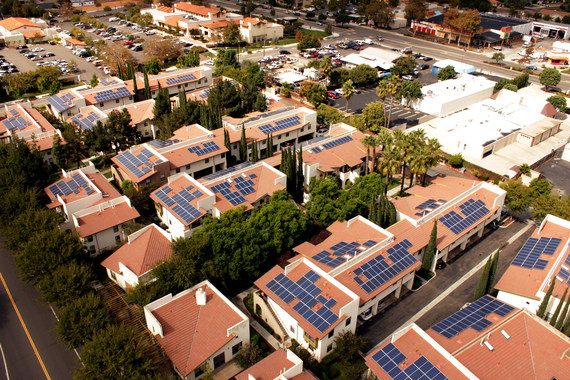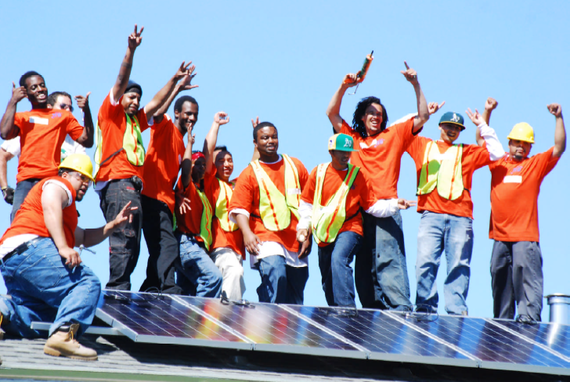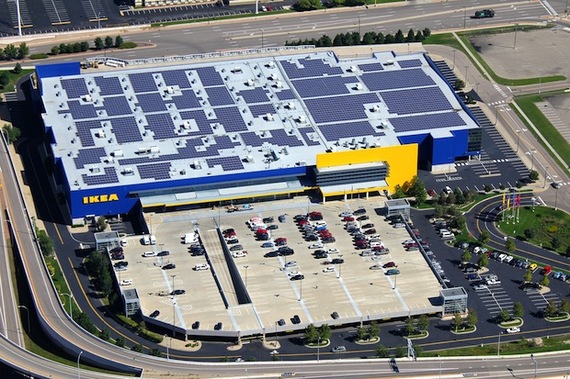
(Photo courtesy CHW)
Imagining futures is a fundamental activity of the human psyche. Apocalyptic blockbusters flood movie theaters every summer, technologists imagine how silicon will next transform our lives, and everyone from political analysts to comedians predicts how a President Trump would reshape (destroy) our country. Alongside the release of President Obama's Clean Power Plan, one future that we are realizing nearly as quickly as we imagine it is clean energy as a solution to climate change. Solar energy has tripled in capacity in the last eight years, rapidly outpacing fossil fuels. But as we fight climate change, we must ultimately remember those who are disproportionately harmed by environmental crises. In a recent Solutions Journal article Gregory Rosenthal and Marjeela Basij-Rasikh remind us, "the fight of workers, women, farmers, indigenous peoples, and so many others--not just for survival, but for vibrant and resilient communities--represents the many manifestations of environmentalism across the world." As we create the future we imagine, we must challenge ourselves to not only make a clean energy future, but an equal energy future as well.
Solar "Revolution"?
New financing models have driven an explosion in the growth of solar projects across the United States. However, in order to qualify for these financing models, customers must fit a unique profile: home or building owners that have unshaded rooftops and excellent credit. If you're lucky enough to fit this profile, hosting a solar installation can have wonderful benefits: lower cost energy prices, increased home value, renewable energy credits, and, most importantly, bragging rights.
If you read past the climate denialist and Koch-funded white noise, most of the coverage of the solar industry in the past few years paints a glowing white knight defending the earth from the dark scourge of the fossil fuel industry. What is often unmentioned is to whom the spoils of this victory go (of which I am guilty). Solar's growth has been spectacularly valuable for homeowners who are seeing cost savings on their energy bills, big businesses like Wal-Mart and Ikea that have installed hundreds of MW of solar to cut energy prices in their big-box stores, and solar companies that have developed profitable and scalable business models. But often left out of the narrative are those people who could be benefiting the most from cleaner, cheaper energy.
Nearly 40 percent of US households earn less than $40,000 per year, but these households have enjoyed less than five percent of solar installations. Low income families have trouble securing financing for solar installations because they tend to have smaller savings, less income to borrow against, and lower credit scores. But low income households are actually the ones that could benefit most from the financial savings solar provides, as their electric bills account for 6% of family expenses compared to 2% for wealthier households on average. It's like reserving affordable, healthy food only for the wealthy (oh wait...).
The story of solar job creation has been well-touted, but how it could also be a tool of poverty alleviation and economic development for disadvantaged communities must become part of the discussion. A George Washington University study estimates that taking low-income households solar could increase annual budgets up to $23 billion and create over 100,000 jobs.
What is to be done?

(Photo Courtesy Ella Baker Center)
In a recent op-ed, Mark Ruffalo, the literal embodiment of green energy and co-chair of the 100% campaign, notes "For a long time, everybody thought of solar panels as something only rich people could afford. But when you think about it, the fuel -- sunlight -- is free." A number of leaders are working alongside Ruffalo to make the benefits of this free, clean fuel available to everyone.
A few weeks before the widely hyped Clean Power Plan, President Obama announced an initiative announced that sets up a number of programs for improving clean energy access. The administration pledged to install 300MW of solar on federally subsidized housing by 2020 alongside $520 million in pledges by states, localities and private sector players. Earlier, Obama announced a job training program that would train 75,000 additional workers for jobs in clean energy, an industry with job growth already ten times that of the rest of the economy, with a new Americorps program for installing solar in low-income communities. Programs like these need to be expanded tenfold.
The initiative also expands community solar programs. 1 GW of community solar gardens have been proposed in Minnesota under our ambitious new program. Community solar gardens enable renters and low income families to purchase cheap solar energy from off-site installations, expanding solar access. Only a few states have active community solar programs, but if spread to all states, these programs could double the rate of solar growth and open clean energy to 100% of Americans.
Many banks or financiers won't lend to low income solar customers because of their low credit scores or lack of savings. New York and Connecticut have both founded Green Banks that offer credit enhancements, lowering default risks and absorbing potential losses for clean energy investments. Credit enhancement and support mechanisms need to open financing options to all families. Many of these financing mechanisms were proposed in Bernie Sanders' "Low Income Solar Act" that was introduced to the Senate in July.
A number of powerful grassroots initiatives have emerged to widen access to solar. Van Jones, Obama's former Green Jobs adviser, heads a group called Green for All that leads campaigns to fight against environmental injustice and advocates for green jobs. Jones recently argued, "Workers in green industries such as solar energy tend to receive higher wages than a number of average-wage jobs, and many of the jobs in the solar industry require less formal education -- a good recipe for escaping poverty. These are exactly the kinds of jobs we need."
Working on climate change and clean energy involves constantly imagining a cleaner, more sustainable future. We are driven by the narrative, the narrative of existential necessity, of low-carbon energy overtaking the fossil fuel industry. Ultimately to help people. Our generation has the rare opportunity to create the future that we imagine, but with this opportunity comes the responsibility to make it a better future for everyone.
(A similar version of this story appeared in The Journal of Environmental Investing)
